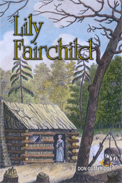
 |
Born in 1845 in Lambton County, Ontario, Lily Fairchild is the daughter of Irish immigrants. After her mother dies, others help raise Lily while her father works and helps the Underground Railroad. Lily spends the rest of her childhood with Aunt Bridie in Sarnia. She marries and has two sons. She later moves to Mushroom Alley in Point Edward. After a stint in London with a new husband, she returns home under a different name. She marries a third time and raises a grandson. She becomes a mute and a matriarch of her community.
Lily's love for life is cultivated early through a connection to the land and its indigenous people. She adopts their language and habits, mistrusting churches and institutions and sticking close to natural settings. The longer she lives on the periphery of society, the safer a haven she makes for other marginalized people. A curious listener and question-asker, she absorbs others: stories, becoming a repository for the few joys and many heartaches of her era. Through wars, railroad expansion, industry, depression, and epidemic, Lily remains a constant observer. With her gentle, welcoming spirit, her story becomes a collective one, belonging to all she touches.
As Lily reaps the tragic results of her indomitable love, the text progresses from a linear chronology in the beginning into a mystical, poetic montage by the end. The last section of the book toggles back and forth in time and includes dreams, poems, letters, and stories of bygone characters told in a jaunty dialect. Literary giants like Schopenhauer and Wilde grace the text with philosophy and solemnity. Lily's voice strengthens, even though she doesn't speak, beckoning a new chapter in history. In an epic rendered in fluid prose and poignant portraits, Lily personifies Canada's soul at the turn of the century.
RECOMMENDED by the US Review